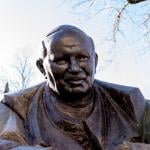THE QUESTION:
Do beards symbolize good or bad character?
THE RELIGION GUY’S ANSWER:
Any self-respecting Santa Claus will have actual or artificial paunch, a red suit and, perhaps most important, that luxuriant white beard. Yet notwithstanding shopping-mall Santas and St. Nicholas, the bearded but skinny 4th Century original, some fear that beards symbolize questionable character.
Take the New York Yankees. Please. In 1973, boss George Steinbrenner was perturbed by a player’s sloppy appearance during the National Anthem and ever since no player or other employee has been allowed to have a beard or long hair “except for religious reasons.” The Yankees presumably borrowed their famed appearance code from the U.S. military and police departments.
And yet. Jesus Christ is portrayed with a beard, since in the 1st Century mostly the upper crust had the time and money to bother with shaving. As for revered secular figures, Abraham Lincoln decided to become America’s first bearded president for unknown reasons just after his 1860 victory (though predecessors John Quincy Adams and Martin Van Buren sported serious sideburns).
A cloud of suspicion hovers over chin whiskers in the U.S.-based Church of Jesus Christ of Latter-day Saints (nicknamed LDS and, formerly, “Mormon”). Headquarters personnel are almost always clean-shaven, and the same for young male missionary duos unless their district leader happens to allow beards.
This is not, however, a matter of doctrine. The elaborate rules and regulations in the LDS “General Handbook” amiably encourage “appropriate dress and appearance,” which “varies across cultures and for different occasions.” The Handbook cautions that “members and leaders should not judge others based on dress and appearance.”
Anticipating the Yankees, the faith’s flagship Brigham Young University barred beards in 1971 and still does. The new policy was explained in an address to the student body by then-President Dallin Oaks. Though beards and long hair “are not inherently evil,” he said, to most people they “are associated with protest, revolution, and rebellion against authority.” Even if students do not intend it, such “slovenly appearance” may “emulate and honor the drug culture or the extreme practices” of dissidents. He added that “the rules are subject to change” and might well disappear sometime in the future.
In that hope, an online petition campaign this year appealed for BYU repeal. The petitioners note that although founder Joseph Smith Jr. was clean-shaven, all of his successors as the LDS prophet/president had beards from 1844 till 1951. (Incidentally, clean-shaven attorney Oaks is now next in the line to succeed 97-year-old surgeon Russell Nelson as LDS president.)
Across the history of religion, beards are often not just allowed but encouraged or revered. And in one world religion with 28.5 million followers, Sikhism, they are an absolute requirement.
Last March, 1st Lieutenant Sukhbir Singh Toor became the first Sikh to formally ask the U.S. Marine Corps to waive its ban on beards so he can honor that religious duty. The military offered an accommodation but with restrictions that remain unacceptable to Toor and his advisors in the Sikh Coalition. A lawsuit may ensue. The coalition also wants the Navy, Coast Guard, and new Space Force to allow beards for Sikhs.
An October 21 article in Indiatimes.com noted that the U.S. Army permitted beards for individual Sikhs in 2009 and 2016 and has since updated its regulations to provide this for all observant Sikhs. The Air Force did the same in 2019. American Sikhs base their appeals on the 1993 federal Religious Freedom Restoration Act (which U.S. House Democrats have voted unanimously to invalidate when religion conflicts with LGBT causes).
Khalsa (“pure”) status is attained by a male Sikh in the sacred initiation as prescribed in 1699 by the 10th in the line of founding gurus, Gobind Singh. Kesh (uncut hair) is one of a man’s five mandatory personal symbols of devotion along with a special dagger, bracelet, comb, and underwear. An official British brochure even declared that any initiated Sikh who shaves “becomes an apostate.”
In the Jewish Scriptures, shaving of facial hair accompanied times of grief or, by contrast, was applied to signify dishonor. A prohibition on shaving in Leviticus 21:5 affected only priests, but Jewish custom often applied it to believers in general. Observant Orthodox Jews today often choose to be bearded and will avoid shaving on the Sabbath, regarded as work, on certain festivals, and for at least 30 days during a period of mourning.
Similarly in Islam. Shaving is not forbidden but beards are commonplace. The Quran is silent on the matter. But respected traditions say the Prophet Muhammad urged followers against imitating unbelievers by either cutting off beards or trimming them too short (the length of one’s fist is a common rule) and taught that men without beards cannot head the community or lead the weekly prayer service. Islam also favors beards as a means to distinguish between the two genders.












